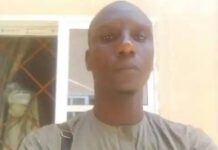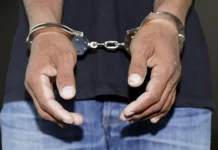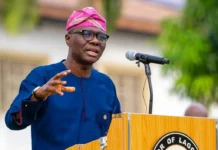 150 Enugu indigenes return from Borno
150 Enugu indigenes return from Borno
North, South rivalry caused sect ‘s emergence, says U.S.
IT was the darkest hour for the people of Adazi Nnukwu in Anaocha Local Council of Anambra State as 13 of their kinsmen killed in the Boko Haram attacks in Adamawa State, were buried.
The grief, agony and wailing of the relations of the 13 victims, who included 12 males and a female, broke the serenity that the community had been known.
Parents and friends of the victims rolled on the floor and cursed the perpetrators of the heinous acts at both the church service and burial of their loved ones as their caskets were lined up.
They were murdered by members of the sect in Mubi, Adamawa State on January 6, 2012.
Prominent indigenes and state officials, all dressed in black attires came to pay their last respect to the deceased. The common statement by the relations of the dead, the clergy and state officials was “enough is enough.”
At the burial ground, the wailing heightened as their remains were lowered into the graves.
They were committed to mother earth in separate graves in St Andrew’s Catholic Church cemetery, Adazi Nnukwu.
Their burial came a day after victims of the Madalla blast in Niger State were given mass burial on Wednesday.
The corpses were lowered into the graves at exactly 1.00 p.m. after a Requiem Mass was conducted for them by the Bishop of Awka Diocese, Most Rev. Paulinus Ezeokafor, at St. Andrew’s Catholic Church field.
Filled with emotions and anger, Ezeokafor in the homily tasked the Federal Government to end immediately the killing of Nigerians and destruction of their property in the North, stressing that, “life is sacred and should not be destroyed by anyone.”
He emphasised that “the life of a Southerner is as important as that of a Northerner; just as the life of a Christian is as important as that of a Muslim. Enough is enough.” He warned that Christians would resist further attempt to push them to the wall.
“There is no such thing as the Boko Haram seeking to Islamise Nigeria as they have claimed. The problem is simply that some northern elements who think they should always be the ones to be in power are causing violence as a means to attain power or destabilise the country because one of their own is not in government. They are only using violence to distract us,” Ezeokafor said.
The state governor, Mr. Peter Obi, in grief, noted that, “this is not the first time we are losing our own in the North.”
He recalled that Igbo lost a family of four in the Madalla bomb blast, and many others, also warning that “enough is enough.”
Leader of the Movement for Actualisation of the Sovereign State of Biafra (MASSOB), Chief Ralph Uwazuruike, who did not make a speech at the ceremony simply told journalists: “All I can say for now is that when we finish burying our leader, Dim Chukwuemeka Odumegwu-Ojukwu, we will come up with a strong position on the killing of Ndigbo in the northern states of Nigeria.”
The burial of the victims coincided with the arrival in Ebugu yesterday, 150 Igbo residents in Maiduguri, Borno State. Their return was facilitated by Igboville, a social network of Igbo professionals in Nigeria and the Diaspora, who provided them free luxury buses.
The returnees, who arrived at the 9th Mile Corner, Enugu early yesterday, said they fled the state for safety because members of the Boko Haram sect had made the state unsuitable for them to live.
They told journalists that they relocated to the bush for several days before they got hint of the free buses and came out for the journey.
“We came back because of Boko Haram. My family and I were hiding in the bush until we heard that free buses had been provided for us and we quickly came out and returned home.
“As you can see, I am a happy woman now because, I am out of the Boko Haram area”, one of the returnees, Mrs. Patricia Agballakwe, a native of Nnewi in Anambra State, said.
Another returnee, Eze Pascal, said he could now heave a sigh of relief having been subjected to sleepless nights for fear of either being killed or attacked by the sect members.
Addressing the returnees, the group’s founder, Emeka Maduewusi, urged them to quickly resettle in the East while the government sorts out the security situation.
Meanwhile, the Secretary to the Government of the Federation (SGF), Chief Anyim Pius Anyim has called on Nigerians to look inwards if they truly desire a change because “the problem with Nigeria is Nigerians”.
Anyim, who delivered the inaugural lecture at the Institute of Security Studies, Bwari, Abuja yesterday, said Nigerians are responsible for the downward slide the country had witnessed over the years.
“Our country over the years has not done well, we have not changed as a people. Transformation is a human-centered process that requires our collective efforts, we must change from thinking self to thinking for the generality of the people.”
He added: “To transform, we need synergy within the institutions of state; and between the state and all constructive political, civic and social forces. Thus, our unity will be built on a strong political culture with the requisite values, and attitudes. It is only then that our collective and individual conducts will combine to unleash our full potential.”
While recounting the historical evolution of Nigeria as a country that was looked upon as the guiding light to the developing countries of the world, he stated that most of the programmes and projects initiated by the government were “merely for political purposes, there was no concrete planning, no convincing budget, poor implementation and no commitment to the success…it was just to offer the cure for the symptoms and not to tackle the causes.”
The Executive Intelligence Management Course 5 (EMIC5) is for selected security operatives in the country, including the Armed Forces, Police, Civil Defence, Immigration, Customs, Prisons, department of State Security Service (SSS) and some other important sectors like the National Assembly.
Also, the United States (U.S.) government yesterday attributed the Boko Haram menace to the political rivalry between the North and the South.
The U.S. Ambassador to Nigeria, Mr. Terence McCulley, who disclosed this in Ibadan, Oyo State at a media briefing, also clarified that his country never predicted that Nigeria would break up by 2015 as earlier reported.
The envoy described the violent activities of the sect as unfortunate and assured of his country’s readiness to assist Nigerian government in tackling the problem.
McCulley said this informed the decision of the U.S. government to send bomb experts to Nigeria to boost the country’s anti-terror campaign.





So what point is Mr Anyim trying to make that the innocent people in ‘concentration camp’ called Nigeria is to blamed for no progress?
Well, in a way he may be right that the people choose to live in slavery without revolting to destroy it together with those that are giving life to it.
On the other hand, history had it that i´n such a barbaric jungle, the beasts with fire power and arsenals of mass destruction, won’t have problem wiping them all out and import foreigners to extract the oil for them.
The final official break úp that joke, will be the beginning of freedom and hopr for the future for the people.